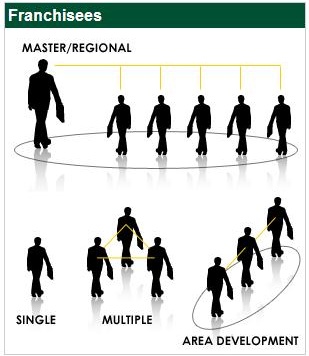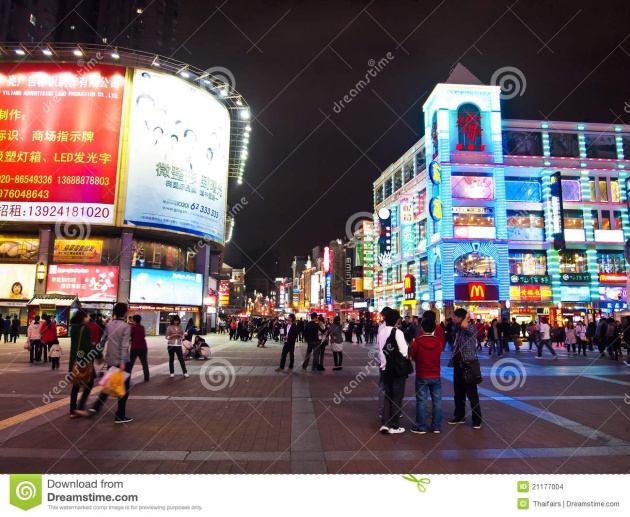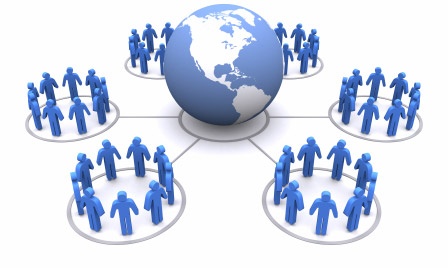 At one time, all small retail businesses, such as clothing stores, restaurants, shoe stores, and grocery stores, were owned by individuals. They often gave the stores their own names: Lucy’s Dress shop, Fred’s coffee shop, Johnson family grocery. For some people, owning a business fulfilled a lifelong dream of independent ownership. For others, it continued a family business that dated back several generations. These businesses used to line the streets of cities and small towns everywhere. Today, by contrast, the small independent shops are almost all gone, and chain stores like the gap, star bucks, and 7- eleven have moved in to replace them. Most small independent businesses couldn’t compete with the giant chains and eventually failed. However, many owners didn’t abandon retail sales altogether. They became small business owners once again through franchises. The franchise system is a contemporary business model that has increasingly dominated the small business sector of retail trade over the last few decades.
At one time, all small retail businesses, such as clothing stores, restaurants, shoe stores, and grocery stores, were owned by individuals. They often gave the stores their own names: Lucy’s Dress shop, Fred’s coffee shop, Johnson family grocery. For some people, owning a business fulfilled a lifelong dream of independent ownership. For others, it continued a family business that dated back several generations. These businesses used to line the streets of cities and small towns everywhere. Today, by contrast, the small independent shops are almost all gone, and chain stores like the gap, star bucks, and 7- eleven have moved in to replace them. Most small independent businesses couldn’t compete with the giant chains and eventually failed. However, many owners didn’t abandon retail sales altogether. They became small business owners once again through franchises. The franchise system is a contemporary business model that has increasingly dominated the small business sector of retail trade over the last few decades. A franchise is a legal and commercial agreement between an individual and a parent company. It gives the person permission to own one of the company’s franchise outlets, to use the company name, and to sell the products or services of the company. A person must apply for a franchise; however, not all applicants are approved. Some may be rejected because of poor financial histories, for example. If approved, the new business owner (the franchisee) must pay a large start-up fee to the company (the franchiser) and agree to follow its regulations. These regulations require complete uniformity in all of its franchises.
A franchise is a legal and commercial agreement between an individual and a parent company. It gives the person permission to own one of the company’s franchise outlets, to use the company name, and to sell the products or services of the company. A person must apply for a franchise; however, not all applicants are approved. Some may be rejected because of poor financial histories, for example. If approved, the new business owner (the franchisee) must pay a large start-up fee to the company (the franchiser) and agree to follow its regulations. These regulations require complete uniformity in all of its franchises. This means that the franchiser establishes the rules for the appearance of the store, both inside and outside. It means the franchisee can sell only the products or services of the parent company. It means that a large coffee must be the same size in every company franchise. It means that all restaurants in a franchise system must put the same number of pickles on their burgers, and use identical napkins, paper cups, and food wrappers. It also means that the franchisee is graded regularly on its performance by the parent company. Not all chain stores are franchises. Some are owned and operated by the parent company. A franchise is owned by the franchisee. Restaurants are the most common franchises. On any city block you are likely to see at least one franchise restaurant, and often three or four. In some shopping centers, the entire complement of stores is made up of franchises. Almost any kind of business can be franchised, including dental offices. Hardware stores. Hotels, gas stations, pet hospitals, tax consultants, fitness centers, cleaning services, movie theaters, and child care centers. Despite the restrictions, there are many advantages to owning a franchise. The most important advantage is the support and assistance of the franchiser. For example, the franchiser can help a new owner find a good location, help plan an efficient use of floor space, and help decide on the amount of goods needed to start up the business. The franchiser also provides detailed training for the owner
This means that the franchiser establishes the rules for the appearance of the store, both inside and outside. It means the franchisee can sell only the products or services of the parent company. It means that a large coffee must be the same size in every company franchise. It means that all restaurants in a franchise system must put the same number of pickles on their burgers, and use identical napkins, paper cups, and food wrappers. It also means that the franchisee is graded regularly on its performance by the parent company. Not all chain stores are franchises. Some are owned and operated by the parent company. A franchise is owned by the franchisee. Restaurants are the most common franchises. On any city block you are likely to see at least one franchise restaurant, and often three or four. In some shopping centers, the entire complement of stores is made up of franchises. Almost any kind of business can be franchised, including dental offices. Hardware stores. Hotels, gas stations, pet hospitals, tax consultants, fitness centers, cleaning services, movie theaters, and child care centers. Despite the restrictions, there are many advantages to owning a franchise. The most important advantage is the support and assistance of the franchiser. For example, the franchiser can help a new owner find a good location, help plan an efficient use of floor space, and help decide on the amount of goods needed to start up the business. The franchiser also provides detailed training for the owner and his staff in all areas of the business. Once established, the franchisee benefits from ongoing research and development by the company to keep the business up-to date and competitive. Company consultants and a network of fellow franchisees offer opportunities to discuss business problems. All these support services provide small business owners with the tools of big business, albeit not for free. There are other advantages to owning a franchise. It helps to own a business that bears the name of a well-known corporation with an acknowledged reputation for good service. Customers are inclined to shop at sores with familiar names, and ore shoppers mean more sales. Individual franchises benefit from the output of expensive advertisements paid for by the company, which mighty overlap with local advertising by franchisees. When this happens, there is an extra benefit. Finally, the franchisee is not an employee of the company. He is a business owner; motivate to work hard to make his business successful. The major disadvantage of the franchise model is the close economic relationship among the many franchisees and the parent company. For instance, if one franchisee in the system is found guilty of cheating customers, it reflects poorly on the other franchisees in the system. As a result, all the sores may lose customers. Similarly, if the company makes poor business decisions, the entire chain of franchises may be affected. Finally, the business owner must share his profits with the parent company to pay for the many support services that the company provides.
and his staff in all areas of the business. Once established, the franchisee benefits from ongoing research and development by the company to keep the business up-to date and competitive. Company consultants and a network of fellow franchisees offer opportunities to discuss business problems. All these support services provide small business owners with the tools of big business, albeit not for free. There are other advantages to owning a franchise. It helps to own a business that bears the name of a well-known corporation with an acknowledged reputation for good service. Customers are inclined to shop at sores with familiar names, and ore shoppers mean more sales. Individual franchises benefit from the output of expensive advertisements paid for by the company, which mighty overlap with local advertising by franchisees. When this happens, there is an extra benefit. Finally, the franchisee is not an employee of the company. He is a business owner; motivate to work hard to make his business successful. The major disadvantage of the franchise model is the close economic relationship among the many franchisees and the parent company. For instance, if one franchisee in the system is found guilty of cheating customers, it reflects poorly on the other franchisees in the system. As a result, all the sores may lose customers. Similarly, if the company makes poor business decisions, the entire chain of franchises may be affected. Finally, the business owner must share his profits with the parent company to pay for the many support services that the company provides. The success of the franchise system has led to a great expansion in the number of small businesses all over the world. Tried first in the us, the franchise model has revolutionized retail business in many places, improved the economic status of individuals, and strengthened local economies.
The success of the franchise system has led to a great expansion in the number of small businesses all over the world. Tried first in the us, the franchise model has revolutionized retail business in many places, improved the economic status of individuals, and strengthened local economies.
Franchising
Posted on at



